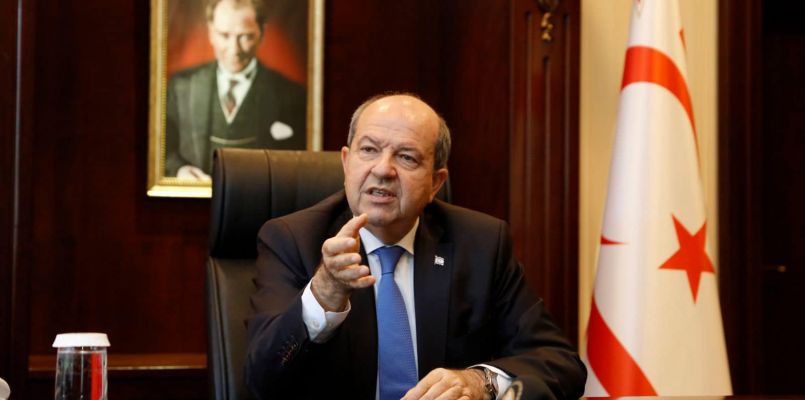President Ersin Tatar Statement:

The Greek Cypriot side are commemorating the so called ‘Independence Day’ of the partnership state which was founded in 1960 by the co-founding partners, the Turkish Cypriots and Greek Cypriots, which, after three years, was converted into an administration run solely by Greek Cypriots who forced the Turkish Cypriot partners out of the entire state apparatus at gun point due to the Greek Cypriot aspiration of uniting the island of Cyprus with Greece (Enosis).
It should be pointed out that this partnership state had come about as a compromise between the Enosis demands of the Greek Cypriots and the "Taksim" demands of the Turkish Cypriots, as an antidote for Enosis. It followed a great deal of pain inflicted on the British and Turkish Cypriot people including killing 371 British servicemen, scores of Turkish Cypriots and even many Greek Cypriots who were opposed to Enosis, from 1955 to 1958, by the Greek EOKA terrorist group. The Turkish Cypriots, who are one of the two inherent sovereign equals and co-owners of the island, and Turkey, who had ruled Cyprus for over 300 years, would naturally not consent to the union of Cyprus with Greece, obliging the Greek Cypriots and Greece to accept the compromise.
British Colonial Secretary, Mr. Lennox-Boyd, had informed the House of Commons, on December 19, 1956, that the two communities had rights to self-determination, where he said: “. . .it will be the purpose of Her Majesty’s Government to ensure that any exercise of self-determination should be effected in such a manner that the Turkish Cypriot community, no less than the Greek Cypriot community, shall, in the special circumstances of Cyprus, be given the freedom to decide for themselves their future status. In other words, Her Majesty’s Government recognise that the exercise of self-determination in such a mixed population must include partition among the eventual options.”
Furthermore, this “pledge” was also reiterated by the then British Prime Minister, Harold Macmillan, on June 26, 1958. This was the context in which the partnership state was established, where neither community had the right to rule over the other.
However, Archbishop Makarios, the leader of the Greek Cypriot community, who had campaigned for the union of the island with Greece, stated on July 28, 1960, that the 1959 London-Zurich treaties was a “springboard” for ENOSIS.
Subsequently, the Greek Cypriot side, under its ENOSIS aspiration, devised the Akritas and Ifestos plans which were designed to ethnically cleanse the island of the Turkish population. On December 21, 1963, known infamously as "the Bloody Christmas", Greek and Greek Cypriot armed elements attacked the Turkish Cypriots all over the island. Hundreds having been killed and thousands wounded or maimed, 30,000 Turkish Cypriots were forced out of 103 Turkish villages and habitations across the island. Tens of thousands of Turkish Cypriots were forced to emigrate from the island or remain under siege in small enclaves without adequate food, water or medication, with practically no electricity. In these enclaves, the Turkish Cypriots suffered systematic human rights abuses for over a decade, including abductions and murders as well as discrimination and humiliation and going through strip searches if they had to travel. Demands were made to make amendments to the Constitution by the Greek Cypriot leadership, which would effectively take away the rights and equal status of the Turkish Cypriots, with the latter also threatening that any court judgement against these changes “would not be recognised”.
The predicament of the Turkish Cypriots, who were forced to live in less than three per cent of the island’s territory in dire conditions for 11 years, became more critical, when, on 15 July 1974, following a coup d’état by the Greek junta aimed at achieving ENOSIS, the state was declared "The Hellenic Republic of Cyprus". Makarios, who had escaped the coup with British help, proclaimed in his speech before the UN Security Council on 19 July 1974 that Greece had invaded Cyprus; the Junta had extended its dictatorship to the island and that Greek Cypriots and Turkish Cypriots were suffering from the coup's consequences. Had Turkey not intervened under the Treaty of Guarantee of 1960, in exercise of its rights and its obligations there would not have been any Turkish Cypriot left nor indeed an independent island, but a colony of Greece in the eastern Mediterranean.
As a result of the long-standing Enosis campaign of the Greek Cypriot side, two administrations of state structures came into being since 1963. The Greek Cypriot administration in the South, which destroyed the partnership ‘Republic of Cyprus’ in 1963, having forced us to govern ourselves for the past 60 years, has no moral, legal or political justification or legitimacy to claim to represent us Turkish Cypriot people or the whole of the island. Upon being forced out of the entire state machinery in 1963, the Turkish Cypriots have developed their own administration in an evolutionary process, starting with a General Committee, to be followed by the Provisional Turkish Cypriot Administration, Autonomous Turkish Cypriot administration, Turkish Federated State of Cyprus and, finally, the Turkish Republic of Cyprus as a fully fledged independent State.
The Greek Cypriot administration, whose leader even today continues to make statements that ‘Cyprus forms an integral part of Hellenism’ and, in a racist manner, refers to the Greek Cypriot people in the South as carrying ‘Hellenistic DNA’; which uses the Greek National Anthem and flag as its own, and which has not had any Turkish Cypriot participation in any of its ranks for the reasons stated above, does not have the right, legitimacy or authority to represent the Turkish Cypriot people or the whole of Cyprus.
What is being celebrated, therefore, is not the independence of the 1960 partnership Republic, but that of an administration that has come about through the expulsion of the Turkish Cypriot people, and the usurpation and continued occupation of the seat of he once bi-communal Republic. To celebrate an event, particularly on an arbitrarily chosen date, shows how oblivious the Greek Cypriot side is to recent history and the current realities on the island and adds insult to injury in so far as the relations between the two peoples of the island are concerned.
It should be pointed out that this partnership state had come about as a compromise between the Enosis demands of the Greek Cypriots and the "Taksim" demands of the Turkish Cypriots, as an antidote for Enosis. It followed a great deal of pain inflicted on the British and Turkish Cypriot people including killing 371 British servicemen, scores of Turkish Cypriots and even many Greek Cypriots who were opposed to Enosis, from 1955 to 1958, by the Greek EOKA terrorist group. The Turkish Cypriots, who are one of the two inherent sovereign equals and co-owners of the island, and Turkey, who had ruled Cyprus for over 300 years, would naturally not consent to the union of Cyprus with Greece, obliging the Greek Cypriots and Greece to accept the compromise.
British Colonial Secretary, Mr. Lennox-Boyd, had informed the House of Commons, on December 19, 1956, that the two communities had rights to self-determination, where he said: “. . .it will be the purpose of Her Majesty’s Government to ensure that any exercise of self-determination should be effected in such a manner that the Turkish Cypriot community, no less than the Greek Cypriot community, shall, in the special circumstances of Cyprus, be given the freedom to decide for themselves their future status. In other words, Her Majesty’s Government recognise that the exercise of self-determination in such a mixed population must include partition among the eventual options.”
Furthermore, this “pledge” was also reiterated by the then British Prime Minister, Harold Macmillan, on June 26, 1958. This was the context in which the partnership state was established, where neither community had the right to rule over the other.
However, Archbishop Makarios, the leader of the Greek Cypriot community, who had campaigned for the union of the island with Greece, stated on July 28, 1960, that the 1959 London-Zurich treaties was a “springboard” for ENOSIS.
Subsequently, the Greek Cypriot side, under its ENOSIS aspiration, devised the Akritas and Ifestos plans which were designed to ethnically cleanse the island of the Turkish population. On December 21, 1963, known infamously as "the Bloody Christmas", Greek and Greek Cypriot armed elements attacked the Turkish Cypriots all over the island. Hundreds having been killed and thousands wounded or maimed, 30,000 Turkish Cypriots were forced out of 103 Turkish villages and habitations across the island. Tens of thousands of Turkish Cypriots were forced to emigrate from the island or remain under siege in small enclaves without adequate food, water or medication, with practically no electricity. In these enclaves, the Turkish Cypriots suffered systematic human rights abuses for over a decade, including abductions and murders as well as discrimination and humiliation and going through strip searches if they had to travel. Demands were made to make amendments to the Constitution by the Greek Cypriot leadership, which would effectively take away the rights and equal status of the Turkish Cypriots, with the latter also threatening that any court judgement against these changes “would not be recognised”.
The predicament of the Turkish Cypriots, who were forced to live in less than three per cent of the island’s territory in dire conditions for 11 years, became more critical, when, on 15 July 1974, following a coup d’état by the Greek junta aimed at achieving ENOSIS, the state was declared "The Hellenic Republic of Cyprus". Makarios, who had escaped the coup with British help, proclaimed in his speech before the UN Security Council on 19 July 1974 that Greece had invaded Cyprus; the Junta had extended its dictatorship to the island and that Greek Cypriots and Turkish Cypriots were suffering from the coup's consequences. Had Turkey not intervened under the Treaty of Guarantee of 1960, in exercise of its rights and its obligations there would not have been any Turkish Cypriot left nor indeed an independent island, but a colony of Greece in the eastern Mediterranean.
As a result of the long-standing Enosis campaign of the Greek Cypriot side, two administrations of state structures came into being since 1963. The Greek Cypriot administration in the South, which destroyed the partnership ‘Republic of Cyprus’ in 1963, having forced us to govern ourselves for the past 60 years, has no moral, legal or political justification or legitimacy to claim to represent us Turkish Cypriot people or the whole of the island. Upon being forced out of the entire state machinery in 1963, the Turkish Cypriots have developed their own administration in an evolutionary process, starting with a General Committee, to be followed by the Provisional Turkish Cypriot Administration, Autonomous Turkish Cypriot administration, Turkish Federated State of Cyprus and, finally, the Turkish Republic of Cyprus as a fully fledged independent State.
The Greek Cypriot administration, whose leader even today continues to make statements that ‘Cyprus forms an integral part of Hellenism’ and, in a racist manner, refers to the Greek Cypriot people in the South as carrying ‘Hellenistic DNA’; which uses the Greek National Anthem and flag as its own, and which has not had any Turkish Cypriot participation in any of its ranks for the reasons stated above, does not have the right, legitimacy or authority to represent the Turkish Cypriot people or the whole of Cyprus.
What is being celebrated, therefore, is not the independence of the 1960 partnership Republic, but that of an administration that has come about through the expulsion of the Turkish Cypriot people, and the usurpation and continued occupation of the seat of he once bi-communal Republic. To celebrate an event, particularly on an arbitrarily chosen date, shows how oblivious the Greek Cypriot side is to recent history and the current realities on the island and adds insult to injury in so far as the relations between the two peoples of the island are concerned.

